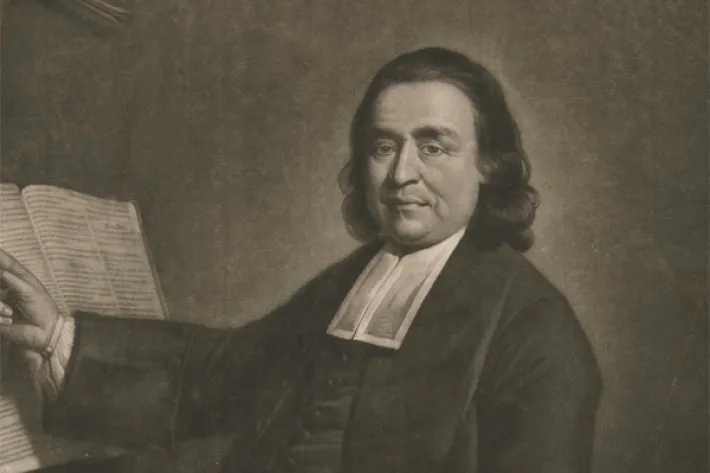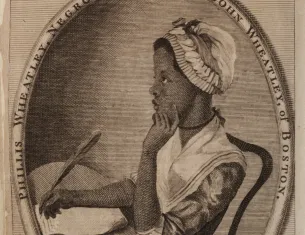Phillis Wheatley to the Reverend Samson Occom on Slavery, 1774

"The Reverend Mr. Samson Occom, The first Indian Minister that ever was." (Yale University Art Gallery)
Phillis Wheatley first corresponded with the Reverend Samson Occom when she was eleven years old. A Mohegan, Occom was a Presbyterian minister and a poet, and the two continued to write letters. In 1774, Wheatley, recently freed from slavery herself, wrote to Occom to express her agreement with his condemnation of Christian ministers who kept people enslaved.
A Letter from Phillis Wheatley to the Reverend Samson Occom, Connecticut Gazette, March 11, 1774
Rev’d and honor’d Sir,
I have this Day received your obliging kind Epistle, and am greatly satisfied with your Reasons respecting the Negroes, and think highly reasonable what you offer in Vindication of their natural Rights: Those that invade them cannot be insensible that the divine Light is chasing away the thick Darkness which broods over the Land of Africa; and the Chaos which has reign’d so long, is converting into beautiful Order, and [r]eveals more and more clearly, the glorious Dispensation of civil and religious Liberty, which are so inseparably Limited, that there is little or no Enjoyment of one Without the other: Otherwise, perhaps, the Israelites had been less solicitous for their Freedom from Egyptian slavery; I do not say they would have been contented without it, by no means, for in every human Breast, God has implanted a Principle, which we call Love of Freedom; it is impatient of Oppression, and pants for Deliverance; and by the Leave of our modern Egyptians I will assert, that the same Principle lives in us. God grant Deliverance in his own Way and Time, and get him honour upon all those whose Avarice impels them to countenance and help forward tile Calamities of their fellow Creatures. This I desire not for their Hurt, but to convince them of the strange Absurdity of their Conduct whose Words and Actions are so diametrically, opposite. How well the Cry for Liberty, and the reverse Disposition for the exercise of oppressive Power over others agree, —
I humbly think it does not require the Penetration of a Philosopher to determine.—
Source: Phillis Wheatley to Samson Occom, Connecticut Gazette, March 11, 1774.
A Letter from Phillis Wheatley to the Reverend Samson Occom, Connecticut Gazette, March 11, 1774
Rev’d and honor’d Sir,
I have this Day received your obliging kind Epistle, and am greatly satisfied with your Reasons respecting the Negroes, and think highly reasonable what you offer in Vindication of their natural Rights: Those that invade them cannot be insensible that the divine Light is chasing away the thick Darkness which broods over the Land of Africa; and the Chaos which has reign’d so long, is converting into beautiful Order, and [r]eveals more and more clearly, the glorious Dispensation of civil and religious Liberty, which are so inseparably Limited, that there is little or no Enjoyment of one Without the other: Otherwise, perhaps, the Israelites had been less solicitous for their Freedom from Egyptian slavery; I do not say they would have been contented without it, by no means, for in every human Breast, God has implanted a Principle, which we call Love of Freedom; it is impatient of Oppression, and pants for Deliverance; and by the Leave of our modern Egyptians I will assert, that the same Principle lives in us. God grant Deliverance in his own Way and Time, and get him honour upon all those whose Avarice impels them to countenance and help forward tile Calamities of their fellow Creatures. This I desire not for their Hurt, but to convince them of the strange Absurdity of their Conduct whose Words and Actions are so diametrically, opposite. How well the Cry for Liberty, and the reverse Disposition for the exercise of oppressive Power over others agree, —
I humbly think it does not require the Penetration of a Philosopher to determine.—
Source: Phillis Wheatley to Samson Occom, Connecticut Gazette, March 11, 1774.
solicitous - concerned
avarice - greed
countenance - support
diametrically - completely
Background
Phillis Wheatley first corresponded with the Reverend Samson Occom when she was eleven years old. A Mohegan, Occom was a Presbyterian minister and a poet, and the two continued to write letters. In 1774, Wheatley, recently freed from slavery herself, wrote to Occom to express her agreement with his condemnation of Christian ministers who kept people enslaved.
Transcript
A Letter from Phillis Wheatley to the Reverend Samson Occom, Connecticut Gazette, March 11, 1774
Rev’d and honor’d Sir,
I have this Day received your obliging kind Epistle, and am greatly satisfied with your Reasons respecting the Negroes, and think highly reasonable what you offer in Vindication of their natural Rights: Those that invade them cannot be insensible that the divine Light is chasing away the thick Darkness which broods over the Land of Africa; and the Chaos which has reign’d so long, is converting into beautiful Order, and [r]eveals more and more clearly, the glorious Dispensation of civil and religious Liberty, which are so inseparably Limited, that there is little or no Enjoyment of one Without the other: Otherwise, perhaps, the Israelites had been less solicitous for their Freedom from Egyptian slavery; I do not say they would have been contented without it, by no means, for in every human Breast, God has implanted a Principle, which we call Love of Freedom; it is impatient of Oppression, and pants for Deliverance; and by the Leave of our modern Egyptians I will assert, that the same Principle lives in us. God grant Deliverance in his own Way and Time, and get him honour upon all those whose Avarice impels them to countenance and help forward tile Calamities of their fellow Creatures. This I desire not for their Hurt, but to convince them of the strange Absurdity of their Conduct whose Words and Actions are so diametrically, opposite. How well the Cry for Liberty, and the reverse Disposition for the exercise of oppressive Power over others agree, —
I humbly think it does not require the Penetration of a Philosopher to determine.—
Source: Phillis Wheatley to Samson Occom, Connecticut Gazette, March 11, 1774.
Excerpt
A Letter from Phillis Wheatley to the Reverend Samson Occom, Connecticut Gazette, March 11, 1774
Rev’d and honor’d Sir,
I have this Day received your obliging kind Epistle, and am greatly satisfied with your Reasons respecting the Negroes, and think highly reasonable what you offer in Vindication of their natural Rights: Those that invade them cannot be insensible that the divine Light is chasing away the thick Darkness which broods over the Land of Africa; and the Chaos which has reign’d so long, is converting into beautiful Order, and [r]eveals more and more clearly, the glorious Dispensation of civil and religious Liberty, which are so inseparably Limited, that there is little or no Enjoyment of one Without the other: Otherwise, perhaps, the Israelites had been less solicitous for their Freedom from Egyptian slavery; I do not say they would have been contented without it, by no means, for in every human Breast, God has implanted a Principle, which we call Love of Freedom; it is impatient of Oppression, and pants for Deliverance; and by the Leave of our modern Egyptians I will assert, that the same Principle lives in us. God grant Deliverance in his own Way and Time, and get him honour upon all those whose Avarice impels them to countenance and help forward tile Calamities of their fellow Creatures. This I desire not for their Hurt, but to convince them of the strange Absurdity of their Conduct whose Words and Actions are so diametrically, opposite. How well the Cry for Liberty, and the reverse Disposition for the exercise of oppressive Power over others agree, —
I humbly think it does not require the Penetration of a Philosopher to determine.—
Source: Phillis Wheatley to Samson Occom, Connecticut Gazette, March 11, 1774.
solicitous - concerned
avarice - greed
countenance - support
diametrically - completely
